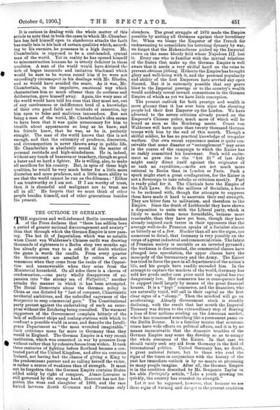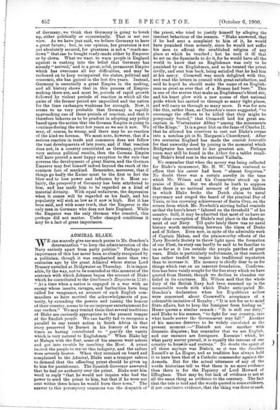THE OUTLOOK IN GERMANY. T HE sagacious and well-informed Berlin correspondent
of the Times declares that "there has seldom been a period of greater national discouragement and anxiety" than that through which the German Empire is now pass- ing. The hot fit of Imperialism which was so notable when Count von Waldersee's Chinese outfit was drawing thousands of sightseers to a Berlin shop two months ago has already given way to a cold fit of doubt whether the game is worth the candle. From every quarter the Government are assailed by critics who are venomous when they come from the ranks of the Opposi- tion and unanswerable when they arise from the Ministerial household. On all aides there is a chorus of condemnation,—one party wholly disapproves of ex- pansion into " the stormy sea of Welfpolitik," another attacks the manner in which it has been attempted. The Social Democrats abuse the German policy in China as one dictated by "lust of conquest, Chauvinistic territorial ambitions, and the unbridled eagerness of the bourgeoisie to reap commercial gain." The Constitutional party protest against the undertaking of such an enter- prise without the Reichstag being consulted. The warmest supporters of the Government complain bitterly of the lack of sufficient ships and coaling-stations with which to confront a possible world in arms, and describe the Intelli- gence Department as "the most wretched imaginable." Such criticisms mean far more in Germany than they would in England. The German Empire is a very recent institution, which was cemented in war by pressure from without rather than by cohesive forces from within. It took three centuries of fighting before Scotland became a con- tented part of the United Kingdom, and after six centuries Ireland, not having had the chance of giving a King to the predominant partner and so calling herself the victor, is rather a source of weakness than of strength. It must not be forgotten that the German Empire contains States added solely by right of conquest. Alsace-Lorraine is still governed by the strong hand, Hanover has not for- gotten .the woes and slaughter of 1866, and the race hatred between South Germans and Prussians only slumbers. The great struggle of 1870 made the Empire possible by uniting all Germans against their hereditary foe. When we blame the Emperor of the French for endeavouring to consolidate his tottering dynasty by war, we forget that the Hohenzollerns picked up the Imperial crown on the same bloody field where Napoleon III. lost it. Every one who is familiar with the mutual relations of the States that make up the German Empire is well aware that it needs a very skilful hand on the reins to prevent obvious jibbing. Hitherto the Empire has brought glory and well-being with it, and the personal popularity and ability of the first Emperors have averted any open discord. But it is extremely possible that any grave blow to the Imperial prestige or to the country's wealth would suddenly reveal inward commotions in the German Empire of which as yet we have little conception.
The present outlook for both prestige and wealth is more gloomy than it has ever been since the shouting people led their first Emperor up the Linden. We have adverted to the severe criticism already passed on the Emperor's Chinese policy, much more of which will be heard as soon as the Reichstag meets. Count von Waldersee will have more than twenty thousand German troops with him by the end of this month. Though a skilful soldier, he has no practical knowledge of irregular warfare. Our own recent experience makes it quite con- ceivable that some disaster or "entanglement" may arise in the course of the campaign to which the Kaiser has so rashly committed his lieutenant. Such wild excite- ment as gave rise to the "hot fit" of last July might easily direct itself against the originator of so rash an expedition,—mobs are not much more rational in Berlin than in London or Paris. Such a spark might start a great conflagration, for the Kaiser is not a Sovereign to take rebuke or criticism meekly. Fuel is ready piled for it. The Clericals hate the Empire of the Falk Laws. So do the millions of Socialists, a force to be reckoned with, though the attempts to suppress them have made it hard to ascertain their real strength. They are bitter foes to militarism, and therefore to the Empire. Since the death of Liebknecht they have shown a disposition to unite with the Liberal party, which is likely to make them more formidable, because more reasonable, than they have yet been, though they have already inspired such terror in their opponents that the average well-to-do Prussian speaks of a Socialist almost as bitterly as of a Jew. Blacker than all are the signs, too numerous to detail, that Germany is very possibly on the verge of a great industrial and commercial crisis. The fabric of Prussian society is unstable as an inverted pyramid ; the workman is discontented, the commercial classes have plunged into speculation, the upper classes have the monopoly of the bureaucracy and the Army. The Kaiser has tried to force the pace in all departments of the nation's life, and his people have readily seconded him. In the attempt to capture the markets of the world, Germany has sold her goods under coat price until her capital has run dangerously low. Her commerce has in consequence had to support itself largely by means of the great financial houses. It is a " kept " commerce, and the financiers, who are naturally timid, will call in their capital on the first clear signs of a "slump." Then the mischief will go on accelerating. Already Government stock is steadily declining, with the result that last month the Imperial Treasury was driven to the extraordinary step of floating a loan of four millions sterling on the American market, which has occasioned something like a permanent panic on the Berlin Bourse. It is a familiar maxim that economic crises have wide effects on political affairs, and it is by no means inconceivable that the domestic troubles of the German Empire may some day develop so as to occupy the whole resources of the Kaiser. In that case we should vainly seek any aid from Germany in the field of international politics. United Germany has, no doubt, a great national future, but to those who read the signs of the times in conjunction with the history of the past her immediate outlook is by no means so promising as many people imagine. After all, the German Empire is in the condition described by Mr. Benjamin Taylor in his able Fortnightly article, "Like a youth growing too quickly, the country has overshot its strength."
Let it not be stipposed, however, that because we see these signs of warning and danger in the present condition of Germany, we think that Germany is going to break up, either politically or economically: That is not , our view. As we have just said, we believe Germany to have a great future ; -.but, in our opinion, her greatness is not yet absolutely secured, for greatness is not a " reach-me- down " that can be bought ready-made either by Emperor or by clown. What we want to warn people in England against is rushing into the. belief -that Germany has already "arrived," and is a great, solid, permanent Empire which has overcome all her difficulties, and may be reckoned on to keep unimpaired the status, political and economic, she has gained in the last five years. Instead, Germany is essentially a great Empire in the making, and all history shows that in this process of Empire- making there are, and must be, periods of rapid growth followed by violent periods of reaction in which all the gains of the former period are imperilled and the nation for the time exchanges weakness for strength. Now, it seems to us very probable that Germany is rapidly approaching one of these periods of reaction, and that it therefore behoves us to be prudent in adopting any policy based upon the notion that the German Empire is going to continue during the next few years as we see it now. We may, of :course, be wrong, and there may be no reaction of the kind we foresee. We must note, however, that if a serious reaction in trade and commerce does not follow. the vast developments of late years, and if that reaction does not, in a country constituted as Germany, produce very serious political results, then the German Empire will have proved a most happy exception to the rule that governs the development of great States, and the German Emperor may feel himself indeed beyond the reach of the common fate of mankind. Remember, moreover, that if things go badly the Kaiser.must be the first to feel the blow and to lose power and influence by it. Most un- fairly, the prosperity of Germany has been attributed to him, and has made him to be regarded as a kind of material divinity. With equal unfairness, the depression when it comes will be regarded as his fault, and his popularity will sink as low as it now is high. But it has been said, and with some truth, that the Emperor is the only man in Germany who does not hate England. While the Emperor was the only German who counted, this perhaps did not matter. Under changed conditions it may be a fact of great importance.



















































 Previous page
Previous page